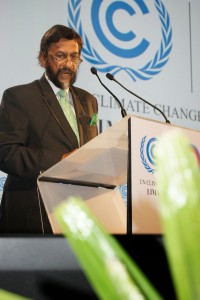One thing is certain among member countries speaking here. COP20 in Lima is the last full meeting before Paris in a year’s time, when the deal is due to be signed. If countries cannot bury most of their differences on the major issues by Friday this week, then the chances of a meaningful and ambitious agreement in Paris 2015 are slim.
Christiana Figueres, Executive Secretary, United Nations Framework Convention on Climate Change told the Lima conference that “we must draw several critical lines of action” such as bringing a draft of a new, universal climate change agreement to the table and clarifying how national contributions will be communicated next year.
Second, we must consolidate progress on adaptation to achieve political parity with mitigation, given the equal urgency of both. Third, we must enhance the delivery of finance, in particular to the most vulnerable. And finally, we must stimulate ever-increasing action on the part of all stakeholders to scale up the scope and accelerate the solutions that move us all forward, faster, she urged.
Interestingly, all is going to the plan of the rich countries and the big emitters following new commitments by Presidents Barack Obama and Xi Jinping of China. They are responsible for 42% of the world’s greenhouse gas emissions. The two presidents provided momentum prior to COP20 by agreeing a deal on climate change.
Under the deal, the US committed to cut US emissions to 26-28% below 2005 levels by 2025, while China has pledged that emissions will fall after 2030. Europe, meanwhile, has agreed to a binding 40% cut by 2030 from 1990 levels. In addition, rich countries have pledged $9.7bn to the new UN Green Climate Fund (GCF).
And it has been agreed that, by March next year, every country in the world would have established plans for reducing or constraining greenhouse gas emissions as well as producing detailed plans on how they intend to fund climate adaptation. But the African groups have a different viewpoint. The developed countries must pay the cost of polluting the environment by helping African countries and developing nations with adaptation, mitigation and green funds.
A joint statement issued by Pan African Justice Alliance (PACJA), the African Civil Society umbrella organization says “additional commitment from the developed countries in providing US$ 100 Billion by the year 2020, the text of the binding Paris agreement among others must be made available to the Lima meeting”.
While delivering his opening remarks, Dr. Rajendra applauded efforts of the developing countries in taking the lead in Adaptation and Mitigation. But African Civil society Organizations at the Conference are sceptical about the available Climate Finance to carry on the efforts.
“Never before have the risks of climate change been so obvious and the impacts so visible. Never before have we seen such a desire at all levels of society to take climate action,” UNFCCC chief Christiana Figueres said.
So, with such consensus on ground, will the Lima talks introduce sanctions in the binding agreement framework paper for Paris 2015 to punish countries that will not comply to individually provide financing and greenhouse gas emission reductions?
Peter Labeja, Lima
 “The window of opportunity to act on climate change is soon closing. Science offers clear rationale for climate action now” says Dr. Rajendra Kumar Pachauri the chairperson of the Intergovernmental Panel on Climate Change (IPCC) during the opening ceremony of the twentieth Conference of Parties, also known as COP20 in Lima, the capital of Peru this morning.
“The window of opportunity to act on climate change is soon closing. Science offers clear rationale for climate action now” says Dr. Rajendra Kumar Pachauri the chairperson of the Intergovernmental Panel on Climate Change (IPCC) during the opening ceremony of the twentieth Conference of Parties, also known as COP20 in Lima, the capital of Peru this morning.










